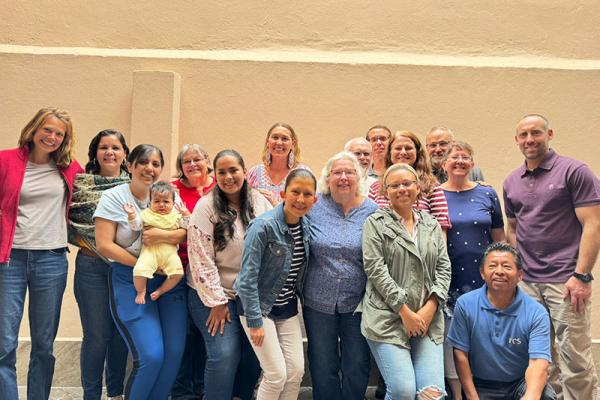What is a safeguarding concern anyway and why should we raise them?

Anna often found herself checking her former teacher's social media pages, curious about what the teacher was doing at her current school. As she scrolled through photos of the teacher with her new students, a sense of unease settled in. Memories of what the teacher had done to her ten years ago came flooding back. Summoning her courage, Anna visited the TeachBeyond website, where she saw information about their safeguarding program. Should she raise a concern about her experience?
At a TeachBeyond conference, Ahmad grew troubled when he noticed that the children in the conference's childcare programme weren’t being adequately supervised during free playtime. Remembering TeachBeyond’s guidance on reporting unsafe practices, he questioned whether he should raise this concern.
Ae-Jong felt worried during her school’s annual camp. One student seemed unusually withdrawn, constantly rubbing his arms as if in pain. When she asked if he was okay, he avoided eye contact and insisted that he was fine. Ae-Jong remembered that any concern about a child's well-being should be raised, but she hesitated, wondering if she might be overreacting.
Alonso knew a TeachBeyond family that was going through a difficult time. Recently, he became alarmed when he heard that the family’s arguments had turned physical. He was aware that children witnessing domestic violence is considered a form of abuse. Should he raise this concern?
As an organization governed by the Charity Commission’s laws, all TeachBeyond members are mandated reporters with a legal and ethical responsibility to promote the safety and wellbeing of children and vulnerable adults. However, our primary motivation, as followers of Christ, is to reflect Jesus in all that we do as an outflow of God’s love for us. This is why we are committed to seeing, hearing, and caring for those who are vulnerable, following biblical commands to protect and respond to their needs, and actively participating in God’s restorative plan for humankind. Our TeachBeyond safeguarding policy and code of conduct, based on this commitment, require us to follow TeachBeyond’s process for raising concerns when we encounter a safeguarding issue.
But in the midst of our busy lives, juggling countless tasks, what does this really mean? What exactly constitutes a safeguarding concern? Let’s take a closer look. A Safeguarding Concern is any situation that has the potential of hindering or impeding the safety and well-being of a child. Our TeachBeyond safeguarding policy states that safeguarding concerns could include:
- Any concerns for the safety and wellbeing of a child. For example:
- disclosures of harm from a child
- a child displaying concerning behaviour(s) or other possible indicators of harm
- concerns that a child has been harmed whether by an adult or another child
- inappropriate relationships developing between an adult and a child
- Any concerns that this Safeguarding Policy and Code of Conduct has been breached
- Any concerns regarding unsafe protocols or practices of TeachBeyond
- Historical reports of past harm
If you have any safeguarding concerns, it is essential that you raise them; whether this is to local statutory authorities or your organization. If you are not a TeachBeyond member, you can always feel free to reach out to safeguarding@teachbeyond.org with concerns—we are happy to provide guidance. If you are a TeachBeyond member, you must raise concerns to your TeachBeyond supervisor or the TeachBeyond Safeguarding Team as soon as possible, and no later than 24 hours after becoming aware of the concern. TeachBeyond supervisors are trained to forward any safeguarding concerns directly to the TeachBeyond Safeguarding Lead. If you are working in a school and the child is under the school’s care, you may need to raise your concern to the school’s safeguarding lead.
When we talk about raising concerns, it’s often easy to think about things that are clearly abusive or criminal, but we need to make sure that we address even minor concerns. A “low-level” concern does not mean that it is insignificant. A low-level concern is any concern – no matter how small. It may even be as simple as causing a sense of unease or a “nagging doubt”. Minor concerns may not always meet the threshold for harm or abuse, yet such behaviors exist on a broad spectrum. This can range from unintentional actions—perhaps stemming from a lack of cultural awareness—that inadvertently cause harm to a child, to more deliberate behaviors intended to facilitate abuse, such as those seen in the early stages of grooming.
Now, consider these varying levels of harm across different global contexts. Harm and abuse take different forms from country to country—and even within the same country, they can manifest in diverse ways. Understanding context is essential when assessing safeguarding risks, but we must never minimize or justify harmful or abusive practices. Regardless of cultural norms, if children are being harmed or abused, they have the right to protection under the United Nations Convention on the Rights of the Child, as well as access to support and intervention. However, the way this protection is implemented will differ depending on the context.
This might sound rather scary and overwhelming! We understand. If you’re unsure or need assistance, you can always email safeguarding@teachbeyond.org for guidance. We are here to listen, discuss any situation with you and ensure you receive the support you need afterwards. Should you ever know of a safeguarding concern please remember the importance of maintaining complete confidentiality for the protection of all involved, especially the child(ren) - we would hate for gossip to cause more harm!
Please do not attempt to handle the concern yourself or conduct your own investigation, including interviewing children or adults involved. TeachBeyond’s Safeguarding Team follows a careful, confidential, and trauma-informed response process. Our team, with expertise in cross-cultural contexts, is well-trained, ensuring a compassionate, sensitive and professional approach. We are committed to always listening and responding with the utmost care to every safeguarding concern.
Let’s revisit the scenarios mentioned earlier. Each of these is a safeguarding concern that must be raised to your supervisor or the TeachBeyond Safeguarding Team. Whether it involves a historical incident, unsafe practices, a child exhibiting concerning behavior, or a potential domestic violence situation, these all meet the criteria for a safeguarding concern.
Failing to raise a concern could tragically leave a child in harm's way. That’s why it is so crucial for us to remain vigilant and prayerfully attentive to the signs of harm or abuse, and to raise any concerns, no matter how small in line with our policy. God calls on us all to protect children and vulnerable adults. In a world where many children are unseen, unheard, and unprotected, we at TeachBeyond have the unique privilege and capacity to ensure they are seen, heard, and kept safe.
The responsibility of safeguarding rests on us all.
Safeguarding Team:
- Bronwen Coe – Safeguarding Lead
- Alison Neumann – Safeguarding Specialist
- Arite Pessoa – LATAM Portuguese-speaking Safeguarding Representative
- Silvia Carrillo – LATAM Spanish-speaking Safeguarding Representative
- Jasper Subramoney – Africa Safeguarding Representative
- Becky Van Oss – Camps Safeguarding Representative



